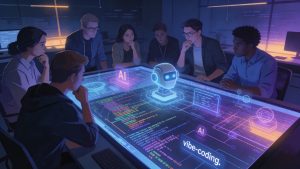Full stack development, which combines front-end and back-end expertise, remains one of the most in-demand skills in the technology world. A full-stack developer is equipped to work across the entire software cycle — from designing user interfaces to handling server logic, APIs, and databases. This complete knowledge allows them to debug efficiently and build versatile applications.
With organizations of all sizes strengthening their digital presence, the demand for full stack developers continues to grow. To stay competitive in this space, professionals must keep pace with new tools, frameworks, and technologies reshaping the industry.
Here are the top 10 full stack development trends to follow in 2025.
1. Low-Code / No-Code Development (LCNC)
Low-code and no-code platforms are reshaping how applications are built. Developed on top of established programming languages, these platforms allow users with limited coding knowledge to create functional products such as websites and mobile apps.
Benefits include:
- Faster deployment with minimal coding.
- Lower costs and broader accessibility.
- Ideal for non-technical teams or quick prototyping.
While LCNC is not a replacement for complex enterprise-grade projects, it provides accessibility for startups and individuals, and it supports rapid innovation.
2. Artificial Intelligence (AI)
AI is no longer just a buzzword — it is at the center of software development. Full-stack developers who integrate AI gain advantages such as:
- Automating repetitive tasks.
- Delivering intelligent features like recommendations.
- Enhancing problem-solving with data-driven insights.
By combining their understanding of user design and backend architecture, full stack developers can leverage AI to improve performance and build smarter, more adaptive systems.
3. Machine Learning (ML)
Machine Learning, a branch of AI, enables systems to learn from data patterns and adapt to new inputs. ML powers everyday technologies, from predictive text and social media feeds to video recommendations.
Key applications include:
- Predictive analytics for decision-making.
- Personalization in user-facing applications.
- Automation through self-learning algorithms.
Full stack developers working with ML need strong programming and problem-solving skills to handle algorithms and model integration.
4. Blockchain Technology
Blockchain is expanding beyond cryptocurrencies into areas like healthcare, logistics, and enterprise security. For full stack developers, this means creating secure and decentralized applications.
Core features of blockchain:
- Distributed ledgers ensuring transparency.
- Automated workflows with smart contracts.
- Improved security in sensitive industries.
As companies seek trust and efficiency in systems, full-stack developers with blockchain expertise will see higher demand.
5. Cybersecurity as a Core Skill
With online threats increasing, cybersecurity is no longer optional. For 2025, integrating robust security practices throughout application development is a critical expectation.
Core skills include:
- Web application security and encryption.
- Authentication frameworks such as OAuth or JWT.
- Risk analysis and vulnerability testing.
Organizations are actively seeking full stack developers who can recognize risks and integrate protection at both front-end and backend levels.
6. Cloud Computing
Cloud platforms like AWS, Google Cloud, and Microsoft Azure continue redefining scalability and collaboration. For enterprises, cloud computing enables flexible, cost-efficient operations.
Why it matters in 2025:
- “Pay-as-you-go” billing for resource efficiency.
- Real-time collaboration across geographies.
- Reduced setup costs compared to physical infrastructure.
Full stack developers with cloud deployment and DevOps expertise are essential to modern teams.
7. Data Science
Data is becoming the most valuable asset for businesses. Integrating data science into full-stack development allows teams to build data-focused solutions with deeper insights.
The workflow includes:
- Collecting and cleaning raw data.
- Analyzing patterns.
- Building machine learning models.
- Data visualization for decision-making.
Companies need full-stack developers who can combine software engineering with statistical methods to refine customer experiences and business strategies.
8. DevOps Integration
DevOps bridges development and operations, creating collaborative pipelines that improve speed, testing, and code reliability.
Why DevOps is a critical trend:
- Continuous Integration (CI) and Continuous Deployment (CD).
- Automated testing and faster release cycles.
- Seamless collaboration across teams.
Being fluent in DevOps practices makes full-stack developers valuable assets in agile-driven software teams.
9. Augmented Reality (AR) and Virtual Reality (VR)
AR and VR technologies are transforming industries like gaming, healthcare, and education. For full-stack developers, the focus lies on creating immersive user interfaces and backend frameworks to power these digital environments.
As more companies invest in extended reality, the demand for developers with AR/VR skills is expected to rise significantly in 2025.
10. Progressive Web Apps (PWAs)
PWAs blend the accessibility of the web with the features of native apps. They provide offline access, push notifications, and fast loading times, making them ideal for mobile-first audiences.
Advantages of PWAs:
- Lightweight and resource-efficient.
- Works seamlessly across devices.
- Improved performance without heavy installations.
PWAs are increasingly preferred by businesses aiming to reach wider audiences at a lower development cost.
Conclusion
The world of full stack development continues to evolve quickly. From AI and machine learning to cloud computing, blockchain, and progressive web apps, each advancement opens new opportunities for developers to grow in 2025.
For businesses, adopting these trends ensures efficiency, scalability, and stronger customer engagement. For developers, staying updated and diversifying skills across these technologies is the key to career growth.
By mastering both core development principles and future-ready trends, full stack developers position themselves as versatile innovators capable of building powerful digital products in an ever-changing technology landscape.
Read more such articles from our Newsletter here.



